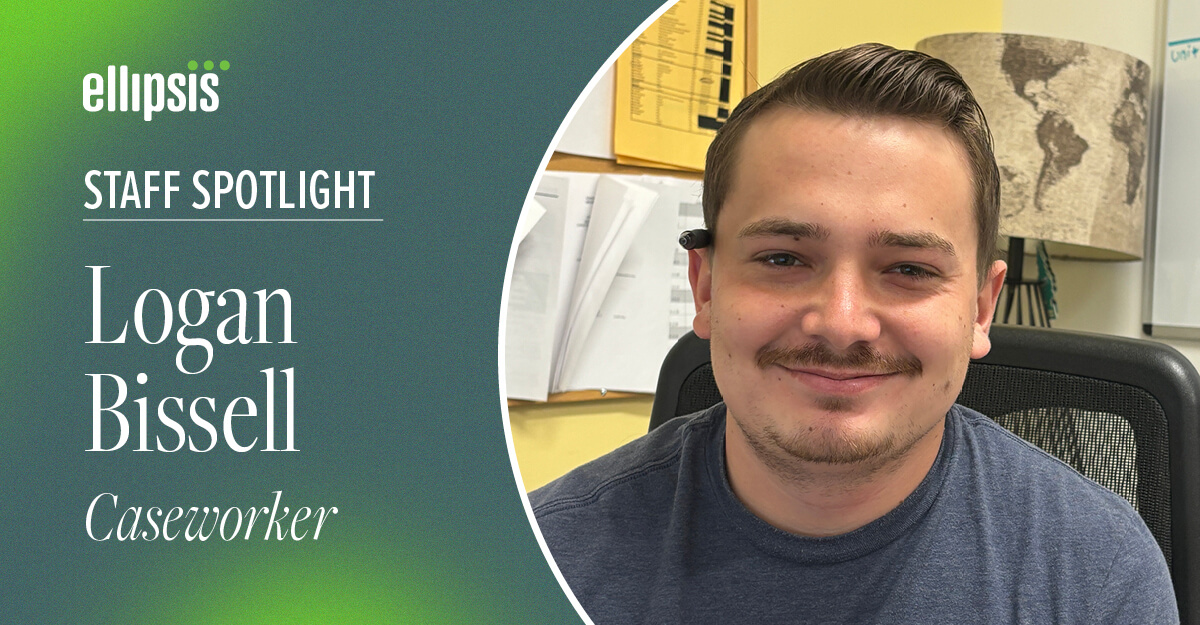Meet Logan Bissell, a dedicated caseworker at Ellipsis, who helps Iowa youth build brighter futures. From his start as a youth care worker to guiding kids through life-changing transitions, Logan shares how compassion, teamwork and persistence create lasting success stories.

What is your position with Ellipsis, and what does a typical day look like for you?
I’m a caseworker. Every day is pretty different. As a case manager, I work with a client’s entire team, and sometimes that includes the kid, their family, Department of Health and Human Services workers, or juvenile court officers. Really, my goal is helping the kids and families find services so the kid can be more successful. That could look like writing court reports, providing updates to everybody on the client’s team or just doing what I can to help the kid be successful during placement.
How long have you worked here, and what initially drew you to Ellipsis?
I’ve worked here for at least four years, starting back when it was Youth Emergency Service & Shelter, or YESS. I was drawn here by accident, really. I was working in life insurance and hated it. I knew a therapist working here at the time, and she recommended I come join the organization. So, I applied, got the job and kind of just stuck around. Originally, it wasn’t going to be long-term. It was a way for me to get my foot in the door because my minor in college was social work, and I had a major in criminology — so this was kind of the area I wanted to be in. I stuck around because I liked the organization even more after they merged. It worked. You can see that the organization cares and wants to set the kids up for their futures and wants to help them be successful and all that.
Have you had any other roles at Ellipsis? How has your journey within the organization shaped your perspective on the need for the programs and services the organization provides?
I started as a youth care worker. In that role, you see the day-to-day things the kids are experiencing because you’re with them constantly. So, while it’s tough sometimes, it's easier to build like those close relationships with them. You watch them learn and how they go through their routine. So going from that into the caseworker role, you see the kids less, but you get to see their team more. It’s a little bit more challenging, but it makes it easier at the same time because you have to work with everybody — the unit staff, the supervisors at the shelter and everyone else who works with that kid. For our role to be successful, I get everybody kind of working together and on the same page.
So being a youth care worker, you’re always there during the escalations, the good and the bad. So to go from that role to this role, I'm able to relate more to what the youth care workers see, as well as what the supervisors see, to a broader perspective. It just makes it easier to work with everybody and kind of understand everybody's different point of view on what they think is best for the kids.
Please share a story about an experience that reaffirmed why you do this work. What made it so meaningful?
When I was a youth care worker, you have a few strong relationships, and you notice when a kid has a good relationship with you. They want to talk with you. As a caseworker, I get to see the bigger picture. I didn’t get that as a youth care worker.
When you are a youth care worker, you're just focusing on the daily tasks. As a caseworker, you get a deeper understanding of the whole plan for the kid. I also get to see the outcomes of the plans, like when the kids do eventually get to return home. Or, because I work with a lot of the juvenile court kids, when I get the email that they got off probation or they got their charges dropped. I like seeing that play out and being a part of those success stories. It shows that we’re making an impact and, you know, kind of getting them to their next place.
What are some of the biggest challenges you face in this job, and how do you overcome them?
There needs to be more resources in the state. It’s challenging to get kids into services, and you have to deal with waitlists and stuff. Like, families don't get bus passes anymore. It feels like every year we lose more and more resources. So over the past few years, I’ve put a lot of emphasis on building my relationships with people out in the community, people who work to provide these services, so I can sometimes squeeze my clients in because of who I know. People have helped me out a lot, which has also helped me overcome some of those issues.
What’s one thing you wish more people understood about the work you do?
I mean, it's just … it's challenging. You have kids with trauma, and they just have a lot of behaviors that kind of follow because of their experiences. It's just not easy work. So it’s easy for people in these places to get work fatigue and to get burned out. It takes a certain kind of somebody to be able to do this on a daily basis. But because of that, it's even more rewarding. You have your good stories, and it's just those few good stories that make it all worth it.
What’s one piece of advice you’d give to someone considering a career in youth services or mental health support?
Don't give up. Learn from the mistakes. Learn from the hard days. Learn from the challenges. I mean, there's been a lot of times where, you know, you have a bad day and, you know, you contemplate if you want to come into work the next day. You’ve just got to keep learning from it. Every kid is so different. It's a nonstop learning curve. Every single thing that happens in this work is an opportunity to grow and learn.
What’s one thing about Ellipsis that makes you most proud to be part of the team?
I feel like the team really cares about the kids. I think it's also the number of successful stories we've had over the years. Every single year, I feel like we have more and more kids who return home or kids who, you know, get to their next placement. It feels like we continue to have more success stories.
The longer I've been here, I've had kids who have aged out call me — they don't have to — but they call me just to tell me, like, “Hey, just want to check in and let you know that I'm doing good.” I've had kids just come here and stop by the shelter because they're in the area. They no longer have DHS involvement, no longer have any reason to be here, but they want to come here and talk and let us know that what we did mattered and helped.
Outside of work, what’s something that brings you joy?
When I'm not working, I'm usually golfing. My favorite golf course would be out in Boone at Honey Creek. It's a drive, so we don't go there very often. When I'm golfing with friends, we'll go to any of the Des Moines courses. Either that or working on the house my girlfriend and I just bought.
Read more Staff Spotlights on our blog.
